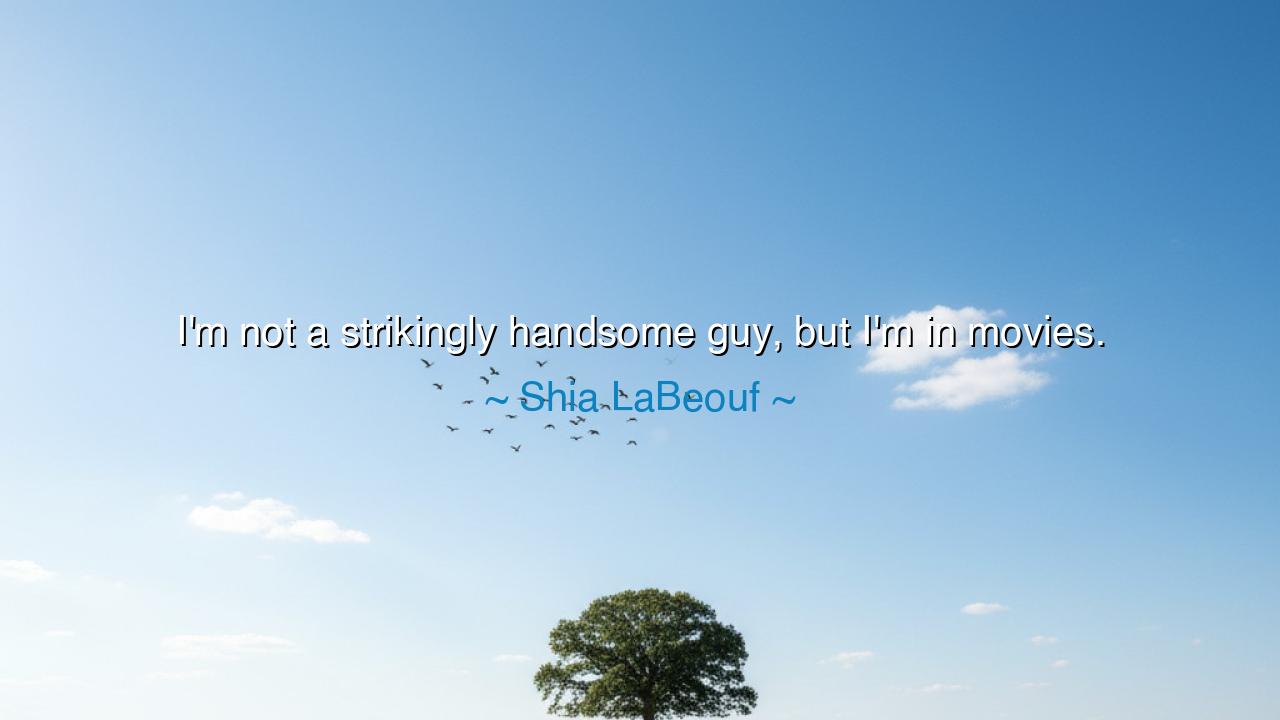
I'm not a strikingly handsome guy, but I'm in movies.






When Shia LaBeouf declared, “I’m not a strikingly handsome guy, but I’m in movies,” he spoke with a humility wrapped in irony, unveiling a truth about art and success that transcends the shallow glitter of appearances. His words remind us that the path to greatness in cinema—or in any field—is not reserved for the beautiful, the flawless, or the outwardly perfect. Instead, it belongs to those who carry within themselves a force of character, a flame of authenticity, and a willingness to pour their entire being into their craft. To admit he is not “strikingly handsome” is to cast aside illusion, and to affirm that what sustains his place in the world of film is something deeper, something more enduring than the symmetry of a face.
The origin of this truth lies in the very history of performance. Since the days when actors first donned masks upon the stages of Athens, the measure of their worth has not been in the beauty of their features, but in their ability to stir the soul. The ancient tragedian was often concealed behind painted wood, yet the power of his voice, the depth of his expression, carried the audience into the realms of gods and fate. Likewise, LaBeouf teaches us that cinema does not live by looks alone. The screen remembers those who act with raw truth, not merely those who fit an image of perfection.
Consider the tale of Humphrey Bogart, who, by the standards of Hollywood, was not a conventionally handsome man. His face was weathered, his features rugged, his presence far from polished. Yet Bogart became an icon, remembered for roles in Casablanca and The Maltese Falcon. Why? Because audiences felt the reality of his characters, because his authenticity outweighed any need for perfect form. In LaBeouf’s words, we hear the same echo: that to endure in art, one must give something real, not merely something pretty.
The meaning of his statement is also defiant. In a world intoxicated by the cult of beauty, where many believe success is the prize of those blessed with striking appearances, LaBeouf stands as an example that substance surpasses surface. His presence in movies is proof that willpower, talent, and vulnerability carve deeper paths than mere symmetry of face. His statement invites us all to rebel against the tyranny of appearances, to remember that greatness is not bestowed only upon those the world calls beautiful.
The lesson here is universal: never let what you lack in one measure become the reason you do not strive in another. You may not be the most handsome, the most brilliant, the most gifted at first glance—but if you bring forth authenticity, perseverance, and daring, doors will open. Beauty fades, charm falters, but truth in art and in life endures. To stand as LaBeouf does, acknowledging imperfection yet still seizing the stage, is to show the heroic act of believing in the worth of one’s deeper self.
What, then, should you do? First, cast off the illusion that worth depends upon the accidents of appearance. Second, cultivate the inner strength that shines brighter than outward form: courage, authenticity, and passion. Third, when doubt whispers that you are not enough, remember LaBeouf’s words—he was not the most handsome, yet he stood where millions dream to stand, because he gave what mattered most: the unfiltered self.
Thus, let his words echo as teaching: “I’m not a strikingly handsome guy, but I’m in movies.” They remind us that the gates of destiny do not open only for the flawless, but for the determined, the authentic, and the brave. Hold fast to this truth: what you believe you lack may not matter, if you dare to step forward with the gifts you do possess. And in the end, it is not the face remembered by history, but the soul revealed through action.






AAdministratorAdministrator
Welcome, honored guests. Please leave a comment, we will respond soon